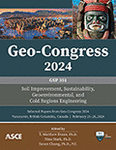Multi-Step Ahead Prediction of Freezing Depth via Deep Learning with Long Short-Term Memory
Publication: Geo-Congress 2024
ABSTRACT
Accurate predictions of freezing and thawing depths could help set up an accurate time for seasonal load restriction (SLR), a load limitation policy that transportation agencies apply to reduce road damages during spring-thaw seasons. Mechanistic or empirical models have been used to predict the freezing and thawing depths. However, these model-based approaches cannot efficiently utilize the rapidly increasing data. This study attempts to apply recurrent deep learning to develop a data-based approach for the prediction of freezing depth. For this purpose, one frequently used algorithm in multivariate time series predictions, that is, long short-term memory (LSTM), is employed considering its ability to preserve historical information and dependencies. An LSTM network was constructed and implemented using the Keras deep learning library in Python for multi-step predictions of freezing depth with weather information as input. This new data-driven approach was tested on available data from road weather information sites in Michigan. Based on the training and validations with different model parameters, the optimum LSTM architecture was obtained for the application. This study showed that the proposed method can obtain satisfactory results for multi-step ahead predictions of the freezing depth.
Get full access to this article
View all available purchase options and get full access to this chapter.
REFERENCES
Baiz, S., Tighe, S., Mills, B., Haas, C., and Huen, K. (2007). “Using Road Weather Information Systems (RWIS) to Control Load Restrictions on Gravel and Surface-Highways.”.
Boon, C. B., and Cluett, C. (2002). “Road weather information systems: enabling proactive maintenance practices in Washington state.”.
Chisholm, R., and Phang, W. (1983). “Measurement and Prediction of Frost Penetration in highways.” Transportation Research Record(918).
Cluett, C., Gopalakrishna, D., and Middleton, D. (2011). “Clarus multi-state regional demonstrations, evaluation of use case# 2: seasonal load restriction tool.”.
Fayer, M. J. (2000). “: Unsaturated soil water and heat flow model theory, user manual, and examples.” Pacific Northwest National Lab., Richland, WA (US).
Hochreiter, S., and Schmidhuber, J. (1997). “Long short-term memory.” Neural computation, 9(8), 1735–1780.
Idell-Sassi, L., Stickel, J. R., Murphy, M., and Carter, P. (2016). “Expanding the Road Weather Information System for Avalanche Support.” Transportation Research Record, 2551(1), 37–44.
Jiji, L. M., and Ganatos, P. (2009). “Approximate analytical solution for one-dimensional tissue freezing around cylindrical cryoprobes.” International journal of thermal sciences, 48(3), 547–553.
Jin, J., Li, M., and Jin, L. (2015). “Data normalization to accelerate training for linear neural net to predict tropical cyclone tracks.” Mathematical Problems in Engineering, 2015.
LeCun, Y., Bengio, Y., and Hinton, G. (2015). “Deep learning.” nature, 521(7553), 436–444.
Liu, Z., Yu, X., Sun, Y., and Zhang, B. (2013). “Formulation and characterization of freezing saturated soils.” Journal of Cold Regions Engineering, 27(2), 94–107.
Lv, Y., Duan, Y., Kang, W., Li, Z., and Wang, F.-Y. (2014). “Traffic flow prediction with big data: a deep learning approach.” IEEE Transactions on Intelligent Transportation Systems, 16(2), 865–873.
Marquis, B. (2008). Mechanistic approach to determine spring load restrictions in Maine. Maine. Dept. of Transportation.
Najafabadi, M. M., Villanustre, F., Khoshgoftaar, T. M., Seliya, N., Wald, R., and Muharemagic, E. (2015). “Deep learning applications and challenges in big data analytics.” Journal of Big Data, 2(1), 1.
Patro, S., and Sahu, K. K. (2015). “Normalization: A preprocessing stage.”.
Soliman, H., Kass, S., and Fleury, N. “A simplified model to predict frost penetration for Manitoba soils.” Proc., 2008 Annual Conference of the Transportation Association of Canada. Transportation Association of Canada, Toronto, Ontario, Citeseer.
Zarrillo, M., Miller, H., Balasubramanian, R., Wang, H., Berg, R., Eaton, R., and Kestler, M. (2012). “Preliminary development of a real time seasonal load restriction system for remote sites.” Cold Regions Engineering 2012: Sustainable Infrastructure Development in a Changing Cold Environment, 380–390.
Tighe, S. L., Mills, B., Haas, C. T., and Baiz, S. (2007). Using Road Weather Information Systems (RWIS) to control load restrictions on gravel and surface-treated highways.
USACE. (1984). “Pavement criteria for seasonal frost conditions.”.
Zhang, J., Zhu, Y., Zhang, X., Ye, M., and Yang, J. (2018). “Developing a Long Short-Term Memory (LSTM) based model for predicting water table depth in agricultural areas.” Journal of hydrology, 561, 918–929.
Information & Authors
Information
Published In
History
Published online: Feb 22, 2024
ASCE Technical Topics:
- Algorithms
- Architectural engineering
- Artificial intelligence and machine learning
- Building management
- Climates
- Cold regions engineering
- Computer programming
- Computing in civil engineering
- Design (by type)
- Engineering fundamentals
- Environmental engineering
- Freeze and thaw
- Freezing
- Highway and road management
- Highway transportation
- Highways and roads
- Historic preservation
- Infrastructure
- Load factors
- Mathematics
- Neural networks
- Seasonal variations
- Structural design
- Transportation engineering
Authors
Metrics & Citations
Metrics
Citations
Download citation
If you have the appropriate software installed, you can download article citation data to the citation manager of your choice. Simply select your manager software from the list below and click Download.
